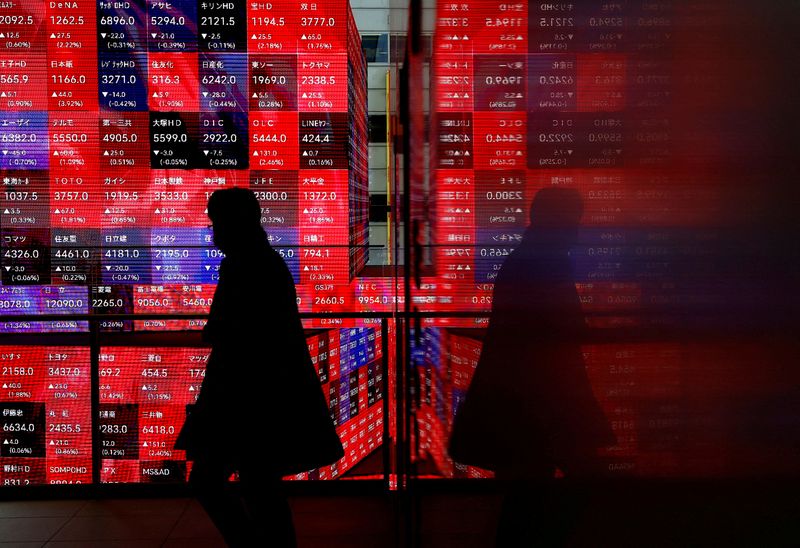By Patturaja Murugaboopathy and Noriyuki Hirata
(Reuters) - As Japanese stocks approach record levels last seen in the 1989 bubble-era, valuation metrics suggest they are still far from overpriced compared to historic levels and global peers.
The Nikkei share average is up nearly 50% in the past year and closing in on its record high of 38,957.44 points touched on the final trading day of 1989.
Yet, on a popular price-to-earnings ratio metric, the MSCI Japan index's 12-month forward ratio stands at 14.1, below the MSCI World index's 17.4 and the MSCI United States index's 20.1.
"From a historical perspective, Japanese stocks at a forward price-to-earnings ratio of 15x do not look expensive versus other markets, especially at current interest rate levels," said Miyuki Kashima, head of Japan investments at Fidelity International.
More importantly, Japanese stocks trade at a low price-to-book value, meaning the shares are underpriced relative to the value of assets on companies' balance sheets.
MSCI Japan's price-to-book ratio is 1.37, much lower than 4.72 recorded in 1989, when the market last hit these highs during Japan's asset price bubble.
The Nikkei's rally over the past year has been fuelled its cheapness, corporate governance reforms and steady buying by foreigners. It has also come after a long period of stagnation since the early 1990s as companies focused more on stability than growth.
The Tokyo Stock Exchange (TSE) has sought to get companies to change conservative accounting practices, by pushing for better governance, share buybacks, lower cross-holdings and increased dividends.
Within its Prime Market segment, which comprises 1,657 companies with a market capitalization exceeding 100 billion yen ($666.67 million) each, 78% traded at a price-to-book ratio below 1 as of December and had outlined initiatives to optimize capital use and enhance stock prices.
Foreign investors aversion to weak Chinese markets have also prompted a search into other Asian assets.
Fidelity Kashima said the TSE's decision to publish the names of companies that have complied with its call to disclose plans had improved governance.
"Ultimately, structural change driven by such reforms will help to optimise capital allocation, while a shift to moderate inflation is supportive of growth in wages and investment," he said.
LSEG data showed approximately one-third of companies in Japan's Nikkei 225 index still trade below book value, compared to a mere 3% ratio for the S&P 500 index.
These reforms have meant the overall yield shareholders are getting in Japan, through buybacks in particular, is more than the headline dividend yield.
MSCI Japan's dividend yield stood at 2.23, surpassing the MSCI World's 1.9. Data from ETF manager WisdomTree shows MSCI Japan index's shareholder yield, which reflects the total returns including dividends and share buybacks, stood at 3.34, much higher than the MSCI World's 2.91.
Attractive valuations have lured foreign investors, who have pumped in about 6.3 trillion yen into Japanese equities last year. Most analysts say foreigners still remain underweight Japan.

Japan's domestic households are also allocating cash to the stock market, via a tax-exempted Nippon Individual Savings Account (NISA) program.
($1 = 150.0000 yen)